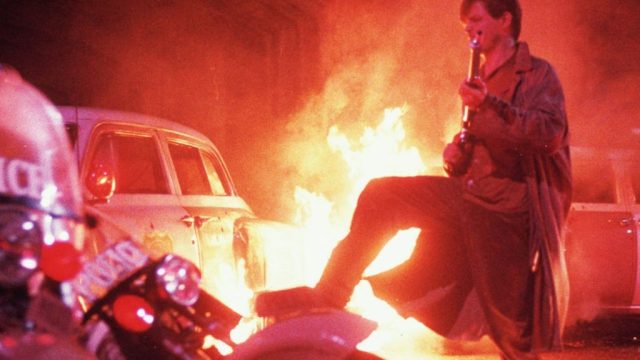Rising From the Ashes This Week:
- pop music
- the 50s and 80s together
- op-ed art
- celebrity coupling
- MoviePass!
Hail the return of Miller and his contributions this week! Send articles throughout the next week to ploughmanplods [at] gmail, post articles from the past week below for discussion, and Have a Happy Friday!
Charles Bramesco looks at a documentary about MoviePass and the machinations behind its downfall in The Guardian:
The documentary positions “Ted & Mitch” v “Stacy & Hamet” in a war for the future of MoviePass, with two finance-world con artists battling two relatively earnest guys trying to build something that could last. Where the original founders saw a labor of love, the new management saw a get-rich-quick scheme, which is exactly what they wanted to do, juicing the stock price in the hope that everything else would figure itself out later. All the while, they failed to address the bills mounting with each ticket price they fronted, totally blind to the fact that people like going to the movies and will do so as much as possible if allowed.
Crooked Marquee‘s Kayleigh Donaldson looks back on Walter Hill’s Streets of Fire and what it brought back from its own past:
As much as Streets feels like a ‘50s throwback, its neon-drenched world where nobody over the age of 35 seems to exist is more the stuff of its time. Hill cited John Hughes, the king of the ‘80s teen saga, as an influence and it’s evident in the character dynamics. The drama is far grander than your average high school story but it all follows the same trajectory: the football hero versus the greaser in a battle for the honor of the homecoming queen. Imagine if Grease was more hallucinogenic and the stakes far higher than not being cool enough for your friends. Certainly, it seems as much inspired by the post-Grease revival of ‘50s aesthetics as it does the decade itself. Dafoe’s Brando-esque biker gear is offset by a quiff that is more Flock of Seagulls than Elvis. The idea of the past cannot help but be more enticing than the real thing.
For Slate, Dan Charnas uncovers the discriminatory origins of the sound of the song of the summer:
Sabrina Carpenter’s “Espresso” is […] a pitch-perfect paean to this period. Co-written by Carpenter with Berklee grad Amy Allen, Steph Jones, and Julian Bunetta, the latter of whom also produced, it gets everything so right it’s uncanny. So right, in fact, that it works seamlessly mashed up with some ’80s classics. Listen to Carpenter over the music bed for the 1982 hit “Sooner or Later” by Larry Graham, the artist better known now as Drake’s uncle. Or listen to her over Central Line’s 1981 hit “Walking Into Sunshine.” Or over 1981’s “I’m in Love,” by Evelyn King, produced by Kashif. Carpenter sells a sound, a song, a look, and a character every bit as much as Ms. Ciccone did back in 1983. Should it be surprising that this sound now returns to the pop charts in a similar package? It should not. Most of our musical culture ends up delivered in this form, eventually.
And at The Point, Ross Barkan considers Jimmy Breslin’s career and example for opinionated journalism:
The Breslin era is long gone. News is now nationalized, and most reporting muscle is aimed at stories that can garner the most eyeballs. Local nonprofit newsrooms have started to dutifully fill the void of the collapsed newspapers, but they notably lack columnists. Nonprofit donors and foundations will underwrite nonpartisan investigative and beat reporters, which is all well and good, but ProPublica, the Texas Tribune, and the CITY (in New York) aren’t cultivating the next Breslins. The reporters there are capable, not colorful. The style that made Breslin famous—sardonic, rat-a-tat, low-literary—isn’t found on those websites. Prose, for Breslin, mattered a good deal, and the prose of most of the new online outlets dully bleeds together, in service of merely conveying information and not enlivening the language.
And because it has concerned FAR readers (and aggregators) of the past, Vulture’s Angelica Jade Bastién, muses on the old-fashioned press hounding of Bennifer:
What fascinates me is this couple’s nostalgic strategy for navigating gossip. When they first became an item, social media had little influence. Trump hadn’t yet proved the worst, inevitable outcome of celebrity idolatry. Then, as they do now, Affleck and Lopez relied on dramatic, planned paparazzi encounters and “leaks” from friendly sources who would run to People to confess that the couple “is not in the best place at the moment” but affirm that “nothing has stopped their love.” They didn’t resort to the expected Notes-app statement or a relatable posed family photo on the grid. That would be too pedestrian. Lopez believes, as I do, that if you exist in the public eye and have been elevated by the people to the kind of stardom she inhabits, you better entertain.

